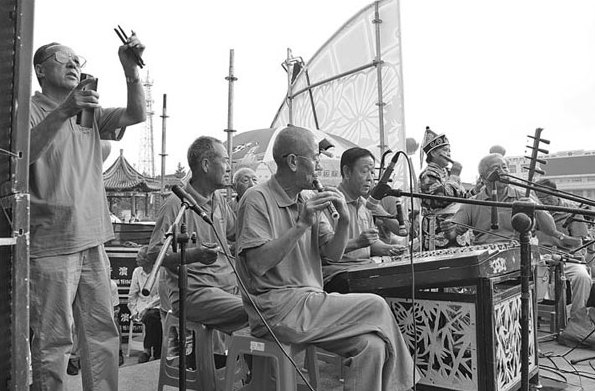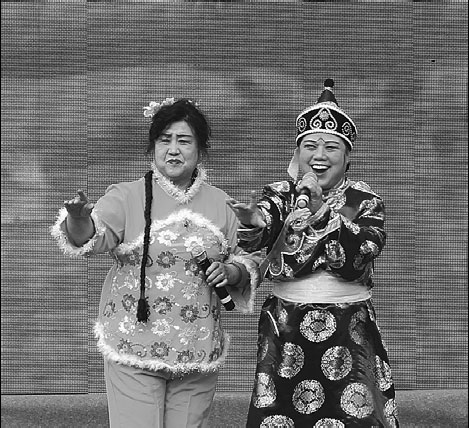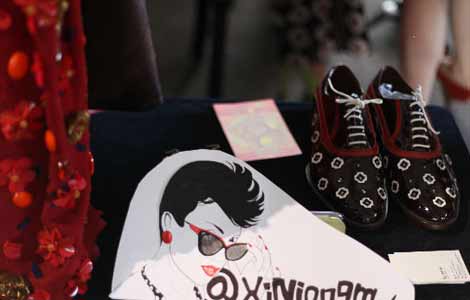Rebirth of grassroots opera
Updated: 2013-08-29 07:13
By Wang Kaihao and Yang Fang (China Daily)
|
||||||||
|
An amateur errentai band performs during the fourth national errentai competition. Photos by Wang Kaihao / China Daily |
A little known style of opera developed in the late 19th century is enjoying a revival in the Inner Mongolia autonomous region, as older people relive their youth and the younger generation begins to learn the traditional skills. Wang Kaihao and Yang Fang report in Hohhot.
It is an astonishing sight. Thousands of people have brought their own wooden benches and gathered in a small square in Hohhot's Tumd Left Banner, hours before the show is scheduled to begin, to ensure they have the best position to view the errentai performance, an opera variety little known in most parts of the country.
Most spectators are over 50, but it is not difficult to spot young faces in the crowd. The eight-day fourth national errentai competition starting from Aug 18, attracted 6,000 participants, including professionals and amateurs.
"This opera was an everyday scene in our childhood," says Liu Guoxian, 63, a local woman who leads 10-odd people from her community amateur troupe to take part in the contest. "But we did not sing it until five years ago when we had more spare time after retirement and found there were fewer and fewer errentai performances in our streets. Our three rehearsals a week finally paid off."
Her team reached the group finals thanks to the audience's earsplitting cheering.
"The extraordinary popularity of the event was beyond our expectation, and the shows lasted until midnight," says an emotional Zhang Defeng, Hohhot's Errentai Association's deputy head, who launched the triennial competition in 2003. "Errentai is close to grassroots, but it is on the verge of disappearance.
"People always organized errentai for big ceremonies, weddings and funerals in old times," says Zhang, who runs a countryside resort. He is a big fan of the opera. "However, modern lifestyle has eroded these customs, which has encouraged me to do something to preserve its memory."
Errentai, literally meaning "two people on the stage", is a comedy traditionally performed by a dan (female role) and a chou (man clown role). It now features multiple roles.
The opera is of ambiguous origins, but is believed to have evolved in the late 19th century when immigrants from Shanxi province moved to Inner Mongolia, in search of better farmland. Several local opera varieties in Shanxi were influenced by and merged with various Mongolian ethnic group's music, such as long song. The opera is now popular in the west of Inner Mongolia, as well as northern parts of three nearby provinces including Shanxi, Shaanxi and Hebei. It became one of the first items listed as national intangible cultural heritages in 2006.
Errentai gradually evolved from relying on dialogue into a form of opera, when the amount of singing increased, most songs reflecting the realities of immigration and the tough day-to-day life in this half-agrarian, half-pasturing land. The opera also features other performances, such as acrobatics.
It uses the melodies of Mongolian music, but uses local dialects of the Han ethnic group. A typical accompanying band uses sihu (a four-string Mongolian-style bowed musical instrument), yangqin (a hammered dulcimer) and mei (an ancient kind of flute), but several other traditional musical instruments have also been used throughout the opera's history, according to Duan Bawang, a veteran errentai performer, also the head of Hohhot Folk Operas Troupe. Established in 1953, it is the first professional troupe whose repertoire includes errentai.
"It had been widely sung in countryside, but never on professional stages, which restricted its development," Duan says. "Many old performers were illiterate."
Errentai mimicked Peking Opera to develop its own academic system in the 1950s, dividing its basic skills into singing, talking, acting and dancing. Music notations were introduced to record old scores. County-level troupes later mushroomed, but there was little communication among performers from different areas until the first national competition was held.
"Young blood is urgently needed to inherit the tradition," Duan says. "But, unlike Peking Opera, small children are not suited to learn errentai.
"Men and women sing the same tone in errentai, which distinguishes itself from other operas. If a young boy begins to sing at a very young age, he will encounter difficulties after his voice breaks."
He says the best age to begin is upon graduation from junior high school.
Yang Cunwang, an errentai performer who started at an arts school in 2003, is one of the pioneers bringing this traditional opera to young people.
"There was a shortage of experienced young performers then," Yang says. "New generation almost had no channel to enter the circle of errentai."
A 2,000-square-meter yard is where more than 200 students at the school receive physical training. A classroom acts as their ballroom for rehearsals. Though the conditions are basic, Yang feels lucky this place was approved as a polytechnic school in 2011, meaning students' tuition is paid by the government. He claims this is the only polytechnic school that teaches errentai in Inner Mongolia.
"If students work hard enough, they can be enrolled by professional troupes after graduation," he says. "In such a society where young people are under heavy pressure to find a satisfactory job, it has been pretty good."
Student Zhang Jiaorong, 18, has to wake up everyday at 6 am, and only has a half-day rest each week, but she is optimistic about the future.
"It's like playing, and not as exhausting as people usually think," says Zhang who comes from Shanxi. "I don't think much about the historical responsibility, but I wish I can be lucky enough to become a professional."
Duan says the professional training is beneficial, with performers learning about other opera forms, elevating errentai into a higher level, but he worries some of the original flavor of the opera will be lost.
"Many performers from the younger generation who are graduating from school now, sing in Mandarin rather than our dialects," he says. "Though they still use dialects when addressing the spoken parts, it feels very strange when combining the two together."
Duan adds that performers also believe, in error, that the higher pitch they can sing, the better they will be, thanks to the influence of TV reality-singing shows.
"We can learn some voicing method from bel canto, but diverse styles are needed," he explains. That is why for years he has been calling for the development of different schools within errentai, just like Peking Opera.
"Artists, no matter how great they are, can only be half-qualified if they cannot make others follow their style. When old errentai artists die, their legacies should be immortal.
"Sadly, we haven't seen that promising situation," he sighs. "Some styles easily disappear."
Contact the writers through wangkaihao@chinadaily.com.cn.
|
Liu Guoxian (left) and her community performance team enter the group finals thanks to their consistent practices. |
(China Daily USA 08/29/2013 page10)

 US vows action in Syria even without UN backing
US vows action in Syria even without UN backing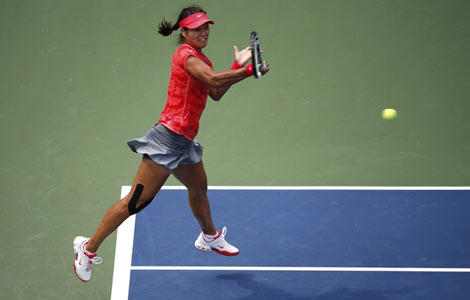
 Li Na advances to 3rd round
Li Na advances to 3rd round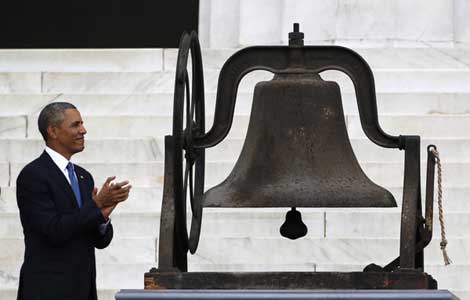
 Obama, marchers mark 50 yrs since King's speech
Obama, marchers mark 50 yrs since King's speech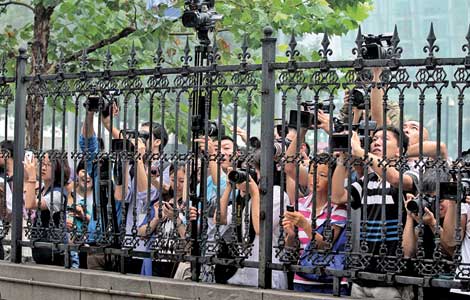
 Singers' son pleads not guilty
Singers' son pleads not guilty
 Rubber duck to float in Beijing
Rubber duck to float in Beijing
 New York Times, Twitter hacked by Syrian group
New York Times, Twitter hacked by Syrian group
 Five apps to help you 'breathe' in Beijing
Five apps to help you 'breathe' in Beijing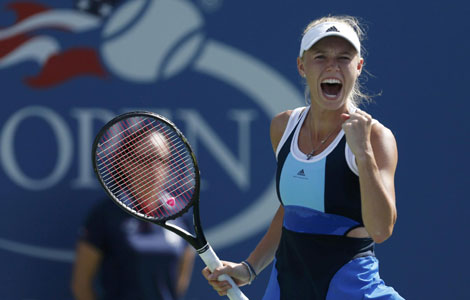
 Wozniacki survives battle with Chinese qualifier
Wozniacki survives battle with Chinese qualifier
Most Viewed
Editor's Picks

|

|

|

|

|

|
Today's Top News
87% of AIDS infections in China through sex
White paper issued on China-Africa cooperation
DC crowds reflect on MLK Jr's dream
China, US officials discuss defense ties
Envoy to seek release of US citizen
China leads the way on multilateral defense co-op
Bond trial program set to expand
China set to lead e-commerce market
US Weekly

|

|
